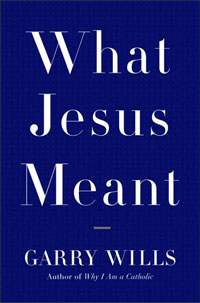Book Notes
 Garry Wills, What Jesus Meant (New York: Viking, 2006), 144pp.
Garry Wills, What Jesus Meant (New York: Viking, 2006), 144pp.
In his book Papal Sin: Structures of Deceit (2000) Garry Wills left readers wondering why he remained Catholic given his unsparing criticisms of institutional Catholicism. He tried to answer that question two years later with Why I Am A Catholic (2002). With five books on Saint Augustine, and his book Lincoln at Gettysburg (1993) that won the Pulitzer Prize, Wills remains one of our country's most important public and outspokenly Christian intellectuals. Today he is Professor of History Emeritus at Northwestern University. In this shorter, more popular book which he describes as "devotional," Wills reaffirms his robust Christian faith.
In a note about his own translations of the Greek New Testament for this book, Wills advises that he is trying to recapture the "rough-hewn majesty" and "brutal linguistic earthiness" of the koine Greek in which the Gospel story was originally written, in contrast to the over-familiar and "churchly" idiom of so many translations. This is important because throughout the book he quotes large portions of Scripture, and his sometimes awkward renditions help us hear afresh the radicality of the message. In fact, Wills is also trying to recapture the radically subversive life, teaching, death, and resurrection of Jesus of Nazareth: "He intended to reveal the Father to us, and to show that he is the only-begotten Son of that Father. What he signified is always more challenging than we expect, more outrageous, more egregious." A homeless "man of the margins," Jesus was anything but respectable, says Wills, and if he was not the God-Man that he claimed to be then he was clearly a blasphemer or a lunatic. He excoriates Thomas Jefferson's scissored-down Jesus who is little more than a "mild humanitarian moralizer," and the more recent Jesus Seminar scholars ("the new fundamentalism") who end up with a bland cardboard cutout. I think Wills is right—the search for the "original" Jesus has strict limits; even if scholars found the "true and original" Jesus behind the Bible texts, he would be more and not less incomprehensible.
In eight brief chapters Wills surveys the life of Jesus. He starts with Jesus as a child and concludes with the resurrection accounts. For Wills Jesus is a sign of contradiction and a threat to political power who in his salvific mission as the Son of God "took up the burden of all mankind" (sic). He inaugurated the "reign of God." In Wills's reading Jesus is a radical egalitarian who saved his harshest criticisms for those who wanted to exercise spiritual authority over others. He regularly broke religious rituals, mocked external purity, and violated social taboos to demonstrate that God in his lavish and indiscriminate love never excludes people because they are unclean, unworthy, or unrespectable: "No outcasts were cast out far enough in Jesus's world to make him shun them." That includes Judas. In short, concludes Wills, "tremendous ingenuity has been expended to compromise these uncompromising words. Jesus is too much for us." In this slender volume he intends to deny that option to anyone who would trim, trivialize or domesticate the Son of God.
Dan Clendenin: dan@journeywithjesus.net


